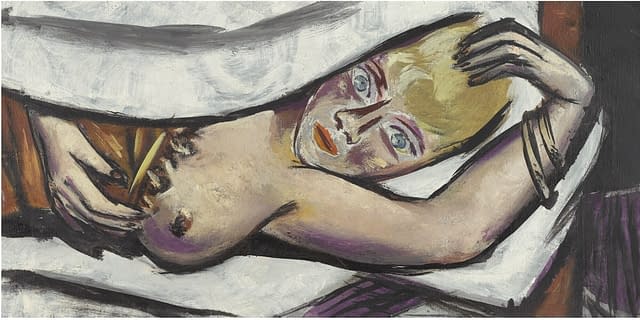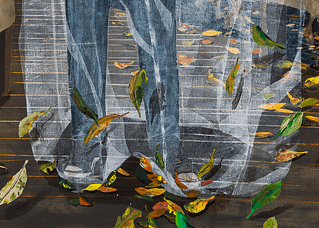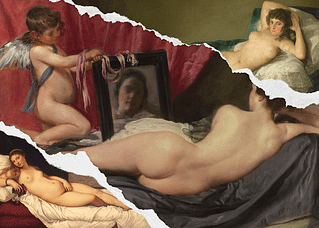
1.2
She found me in the winter at a bar,
one of those places in Bed-Stuy not far
from Clinton Hill — a platonic meeting
set up by a friend who worked in media
and thought we’d get along. I got there first and snatched
a booth and started reading Middlemarch,
a novel I’ve been halfway through for more
than half my life. When she strode through the door,
Oh shit, I love that book, I’ve read it fifteen
times, she said, and asked my favorite scene.
I looked down at page 108,
open on the table. Maybe when Lydgate
first meets Dorothea, and Eliot’s
talking about how the “stealthy convergence of human lots,”
when analyzed in retrospect,
shows a “slow preparation of effects
from one life on another,” I replied. Totally,
she said. The conversation turned to poetry,
our few mutual friends: one’s Ph.D., one’s start-up,
one’s divorce. I was too skittish and caught up
in my charade to feel, charging the space
between us like a ray, the knowing gaze
of Destiny, which Eliot would say stood by
sarcastic with our dramatis personae
folded in her hand. Besides, I practically had a husband —
a man as opposite to her as Casaubon
was opposite to Will. On the A train
home, I read that paragraph again,
then closed the book and marked the chapter,
telling myself that I’d resume it after.
1.3
I thought she thought my life was trivial
since she was queer and edited periodicals
and I was a poet who had never dated a woman.
Every night she’d attend some trendy function
with people dressed in Eckhaus and Givenchy
while I shambled off to walk-in shows at raunchy
bars, or raunchier bars that never put on
shows. Or anyway, that was my perception.
Now I know that hers were mostly networking
events — book launches and openings — their settings
often even spots where I’d have grabbed a drink
myself. Still, when I surveyed the fabric
of my life back then, its familiar openwork
of sex and teaching, kale and NPR,
and the boyfriend at the center I revered
but felt I had been failing many years,
I dreaded she’d dismiss me. (Though when I looked
at him — and at my friends — I thought, How bad could
my life really be with people like these in it?
Gentle, loyal, practical, considerate… )
The difference was, I knew my friends,
I knew my life, while hers remained
a vivid new reality that swirled
behind a scintillating door, a world
where people wore athleisure haute and seemed
to vape incessantly, the sticks lighting up green
or white like tiny pagers every time they’d pull.
I hated the air that came out of them, the smell
like cleaning solvent or an afterthought
of fruit, but found them mesmerizing, too. I’d zone out
and imagine that a tiny person lived inside each
cartridge, who would sprint to switch
the light bulb on and fan the fire
when she felt a drag. She must get so tired,
I would think. This elaborate e-cig reverie
was not so different from my theory
of her life — which, because unknown,
was also marvelous and false, complete invention.
It took months to really reach her through the cloud
of myth my adoration made. Until I could,
I lived in fear she’d finally see
my fetish and discrepancy, and flee.
1.6
You hadn’t intended to see her a second time. But when she invited you out for a drink one Friday night, you decided to go and see if perhaps your desire had waned, had taken care of itself, as strong feelings born of fantasy and instinct sometimes do when brought into the harsh light of lived causality. But it was the same thing all over again — immediately on seeing her, you felt flushed and exposed, as if you’d been caught crying. Your stomach considered for a moment revising the course of its metabolism. You sat at right angles on a banquette in the corner of the room, brushing knees, then hips, then shoulders. At last call, you were the only people there. Then she asked you to share a cab with her; you did; she asked you to walk her in; you did; she asked you to come upstairs; you did; to get into her bed; you did; to press yourself lengthwise against her; you did; to fall asleep like that; you did; to drink coffee with her when you woke; you did; to kiss her on the mouth; you did; to kiss her with your tongue; you did; to let her touch you once, just to see if you were really as wet as you said you were; you did; to unclasp your bra; you did; to rub yourself against her till you came; you did; to read her the erotic poem you loved; you did; to remove your pants; you did; to let her taste you; you did; to come again, inside her mouth; you did; to penetrate her gingerly; you did; to get out of bed at last; you did; to go get pizza down the street; you did; to eat it on the sidewalk in the snow; you did; to go back home with her; you did; to sleep there one more night; you did;
to stay until the sun came up; you did.
2.4
She was also dating someone else,
they believed in alternative relationship models,
which meant she could keep seeing me
provided I agreed to polyamory
and didn’t ask for more than my allowance
of her time. Our dates she scheduled in advance;
the other girlfriend got most Fridays
and any night I stayed in grading essays,
but Tuesdays and Saturdays were mine.
It was equitable by design,
though also not exactly democratic.
During those months there was a lot of panic,
moral and otherwise, concerning men
and domination, “open
borders,” what precisely was harassment.
About sex I had emphatic,
lucid, memorized opinions
crusted over a cesspit of dark ambivalence.
At parties I spoke less and less, skewered
olives on my tiny cocktail sword.
Often, when I kissed my lover,
I could almost taste the other
girl: her close-cropped hair and longer, coltish legs,
her pit sweat and the apricot-ish dregs
of her perfume. Was I not
really a bohemian at all? I’d thought
I had a different heart, one with doors,
one that did not love perforce
toward the condition of possession.
But when she’d pull out of me and toss her harness in
a duffel bag with lubricants
and toiletries to carry to the other girlfriend’s
house, I felt rush through my blood
a surge of insecurity and dread,
and I’d retch and clutch myself and weep.
This was why I liked to keep
two of her fingers in my body
while we slept. I longed to be her property.
I wanted her to smell me in her nail beds
all day long. One morning, as we said
goodbye, I told her that she owned me.
I wanted her to say it back, to preface it with only.
2.6
I kept making the same ludicrous wish
that the things I didn’t like might vanish
of their own accord. Envy. Pimples. Debt.
My stack of griefs. The internet,
whose central purpose seemed to be
to turn the best parts of humanity —
our hungers for belonging, art, and sex —
into surveillance logs and payouts for execs.
It was both invisible and everywhere
like the wealth gap or the ozone layer
and foiled any threat of our collectivizing
by rewarding only purchases and infighting.
Of course I had no plan to make it better.
And I knew my sneering hauteur
was its own repellent habit: an itchy frock
I wore to parties, where I made small talk
about book reviews and carbon capture
while down below the surface of our banter
I’d feel a sheet of rime steadily start
to form between me and my counterpart.
Since when is pleather vegan leather?
Since when is theory clearly better
intel than the news? I’d retreat to someone’s toilet
and despite myself, I’d hit
her up, desperate to be lifted from my body.
Come over, she would say. The literati
can’t give you what I can. And I’d comply.
And it would work. You can’t be lonely,
after all, if you’re not inside yourself.
You can’t be dwelling if you’re somewhere else.
2.7
I went on apps to meet people who weren’t
her or him. There’d be this quick hormonal current
when my finger skimming glass
achieved the grayed-out screen that meant a match,
which then a queasy emptiness produced.
It was like spying in a closet an old coat you used
to wear, and finding it still flatters you and even has a dollar
in the pocket — but then you notice on the collar
a large brown stain like blood, and a tear in the lining
from that frenzied night in Nanjing
with his sister, and a dark mystical whisker
from the cat you owned together
on the cuff… And in your hand isn’t money
but a ticket stub from when you saw La grande
bellezza the week after you cosigned your first lease
in Monterey. So what had felt before like luck now seems
another ploy to show you what you’ve lost.
I’d go for drinks with people over whom I’d passed
a thumb in the affirmative, and sometimes
it was even sort of nice: drinking turbid natural wines
while touching knees, or talking Adrian Piper
with an art student I’d soon learn was a biter
when we kissed. But beneath the conversation
I’d detect this faint reverberation
that, when I listened close, I understood
to be her name. And if I tuned in harder, I would
often hear, below that pitch,
another, deeper throbbing, which was his.


